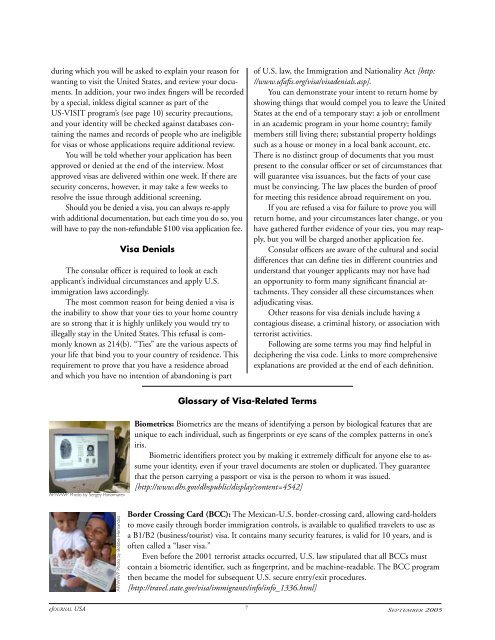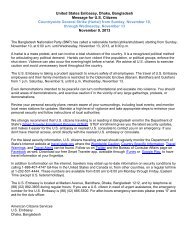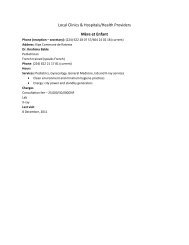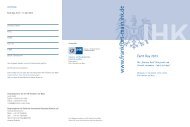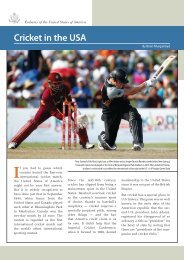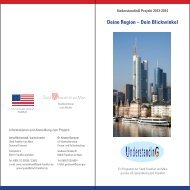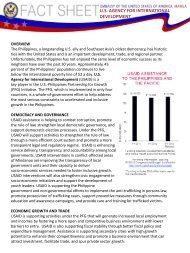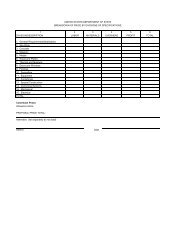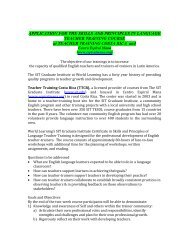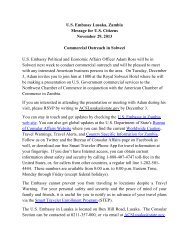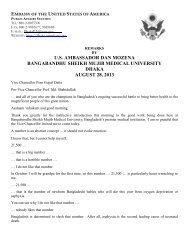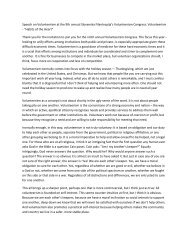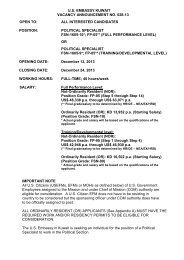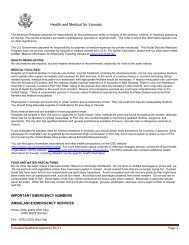See You in the USA - Photo Gallery - US Department of State
See You in the USA - Photo Gallery - US Department of State
See You in the USA - Photo Gallery - US Department of State
You also want an ePaper? Increase the reach of your titles
YUMPU automatically turns print PDFs into web optimized ePapers that Google loves.
dur<strong>in</strong>g which you will be asked to expla<strong>in</strong> your reason for<br />
want<strong>in</strong>g to visit <strong>the</strong> United <strong>State</strong>s, and review your documents.<br />
In addition, your two <strong>in</strong>dex f<strong>in</strong>gers will be recorded<br />
by a special, <strong>in</strong>kless digital scanner as part <strong>of</strong> <strong>the</strong><br />
<strong>US</strong>-VISIT program’s (see page 10) security precautions,<br />
and your identity will be checked aga<strong>in</strong>st databases conta<strong>in</strong><strong>in</strong>g<br />
<strong>the</strong> names and records <strong>of</strong> people who are <strong>in</strong>eligible<br />
for visas or whose applications require additional review.<br />
<strong>You</strong> will be told whe<strong>the</strong>r your application has been<br />
approved or denied at <strong>the</strong> end <strong>of</strong> <strong>the</strong> <strong>in</strong>terview. Most<br />
approved visas are delivered with<strong>in</strong> one week. If <strong>the</strong>re are<br />
security concerns, however, it may take a few weeks to<br />
resolve <strong>the</strong> issue through additional screen<strong>in</strong>g.<br />
Should you be denied a visa, you can always re-apply<br />
with additional documentation, but each time you do so, you<br />
will have to pay <strong>the</strong> non-refundable $100 visa application fee.<br />
eJOURNAL <strong><strong>US</strong>A</strong><br />
Visa Denials<br />
The consular <strong>of</strong>ficer is required to look at each<br />
applicant’s <strong>in</strong>dividual circumstances and apply U.S.<br />
immigration laws accord<strong>in</strong>gly.<br />
The most common reason for be<strong>in</strong>g denied a visa is<br />
<strong>the</strong> <strong>in</strong>ability to show that your ties to your home country<br />
are so strong that it is highly unlikely you would try to<br />
illegally stay <strong>in</strong> <strong>the</strong> United <strong>State</strong>s. This refusal is commonly<br />
known as 214(b). “Ties” are <strong>the</strong> various aspects <strong>of</strong><br />
your life that b<strong>in</strong>d you to your country <strong>of</strong> residence. This<br />
requirement to prove that you have a residence abroad<br />
and which you have no <strong>in</strong>tention <strong>of</strong> abandon<strong>in</strong>g is part<br />
AP/WWP <strong>Photo</strong> by Sergey Ponomarev<br />
AP/WWP <strong>Photo</strong> by Bobbie Hernandez<br />
Glossary <strong>of</strong> Visa-Related Terms<br />
Biometrics: Biometrics are <strong>the</strong> means <strong>of</strong> identify<strong>in</strong>g a person by biological features that are<br />
unique to each <strong>in</strong>dividual, such as f<strong>in</strong>gerpr<strong>in</strong>ts or eye scans <strong>of</strong> <strong>the</strong> complex patterns <strong>in</strong> one’s<br />
iris.<br />
Biometric identifiers protect you by mak<strong>in</strong>g it extremely difficult for anyone else to assume<br />
your identity, even if your travel documents are stolen or duplicated. They guarantee<br />
that <strong>the</strong> person carry<strong>in</strong>g a passport or visa is <strong>the</strong> person to whom it was issued.<br />
[http://www.dhs.gov/dhspublic/display?content=4542]<br />
7<br />
<strong>of</strong> U.S. law, <strong>the</strong> Immigration and Nationality Act [http:<br />
//www.ufafis.org/visa/visadenials.asp].<br />
<strong>You</strong> can demonstrate your <strong>in</strong>tent to return home by<br />
show<strong>in</strong>g th<strong>in</strong>gs that would compel you to leave <strong>the</strong> United<br />
<strong>State</strong>s at <strong>the</strong> end <strong>of</strong> a temporary stay: a job or enrollment<br />
<strong>in</strong> an academic program <strong>in</strong> your home country; family<br />
members still liv<strong>in</strong>g <strong>the</strong>re; substantial property hold<strong>in</strong>gs<br />
such as a house or money <strong>in</strong> a local bank account, etc.<br />
There is no dist<strong>in</strong>ct group <strong>of</strong> documents that you must<br />
present to <strong>the</strong> consular <strong>of</strong>ficer or set <strong>of</strong> circumstances that<br />
will guarantee visa issuances, but <strong>the</strong> facts <strong>of</strong> your case<br />
must be conv<strong>in</strong>c<strong>in</strong>g. The law places <strong>the</strong> burden <strong>of</strong> pro<strong>of</strong><br />
for meet<strong>in</strong>g this residence abroad requirement on you.<br />
If you are refused a visa for failure to prove you will<br />
return home, and your circumstances later change, or you<br />
have ga<strong>the</strong>red fur<strong>the</strong>r evidence <strong>of</strong> your ties, you may reapply,<br />
but you will be charged ano<strong>the</strong>r application fee.<br />
Consular <strong>of</strong>ficers are aware <strong>of</strong> <strong>the</strong> cultural and social<br />
differences that can def<strong>in</strong>e ties <strong>in</strong> different countries and<br />
understand that younger applicants may not have had<br />
an opportunity to form many significant f<strong>in</strong>ancial attachments.<br />
They consider all <strong>the</strong>se circumstances when<br />
adjudicat<strong>in</strong>g visas.<br />
O<strong>the</strong>r reasons for visa denials <strong>in</strong>clude hav<strong>in</strong>g a<br />
contagious disease, a crim<strong>in</strong>al history, or association with<br />
terrorist activities.<br />
Follow<strong>in</strong>g are some terms you may f<strong>in</strong>d helpful <strong>in</strong><br />
decipher<strong>in</strong>g <strong>the</strong> visa code. L<strong>in</strong>ks to more comprehensive<br />
explanations are provided at <strong>the</strong> end <strong>of</strong> each def<strong>in</strong>ition.<br />
Border Cross<strong>in</strong>g Card (BCC): The Mexican-U.S. border-cross<strong>in</strong>g card, allow<strong>in</strong>g card-holders<br />
to move easily through border immigration controls, is available to qualified travelers to use as<br />
a B1/B2 (bus<strong>in</strong>ess/tourist) visa. It conta<strong>in</strong>s many security features, is valid for 10 years, and is<br />
<strong>of</strong>ten called a “laser visa.”<br />
Even before <strong>the</strong> 2001 terrorist attacks occurred, U.S. law stipulated that all BCCs must<br />
conta<strong>in</strong> a biometric identifier, such as f<strong>in</strong>gerpr<strong>in</strong>t, and be mach<strong>in</strong>e-readable. The BCC program<br />
<strong>the</strong>n became <strong>the</strong> model for subsequent U.S. secure entry/exit procedures.<br />
[http://travel.state.gov/visa/immigrants/<strong>in</strong>fo/<strong>in</strong>fo_1336.html]<br />
SEPTEMBER 2005


